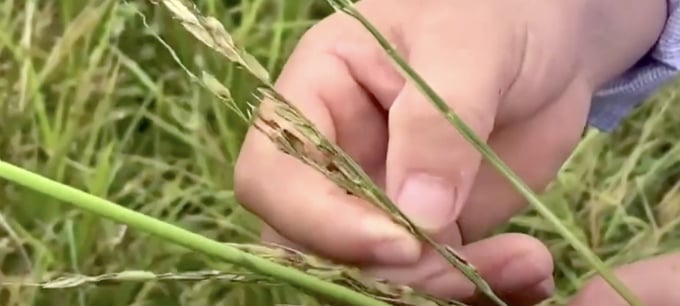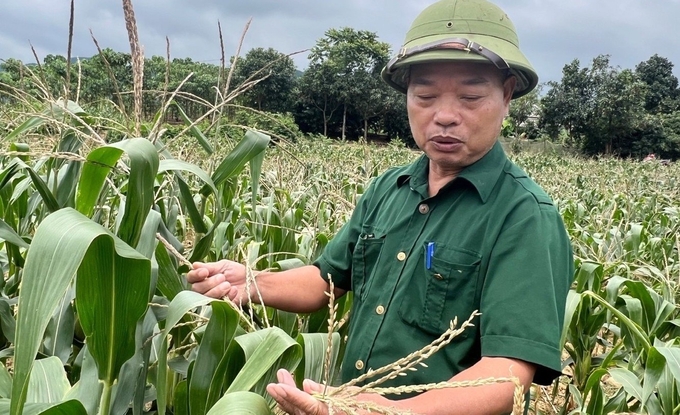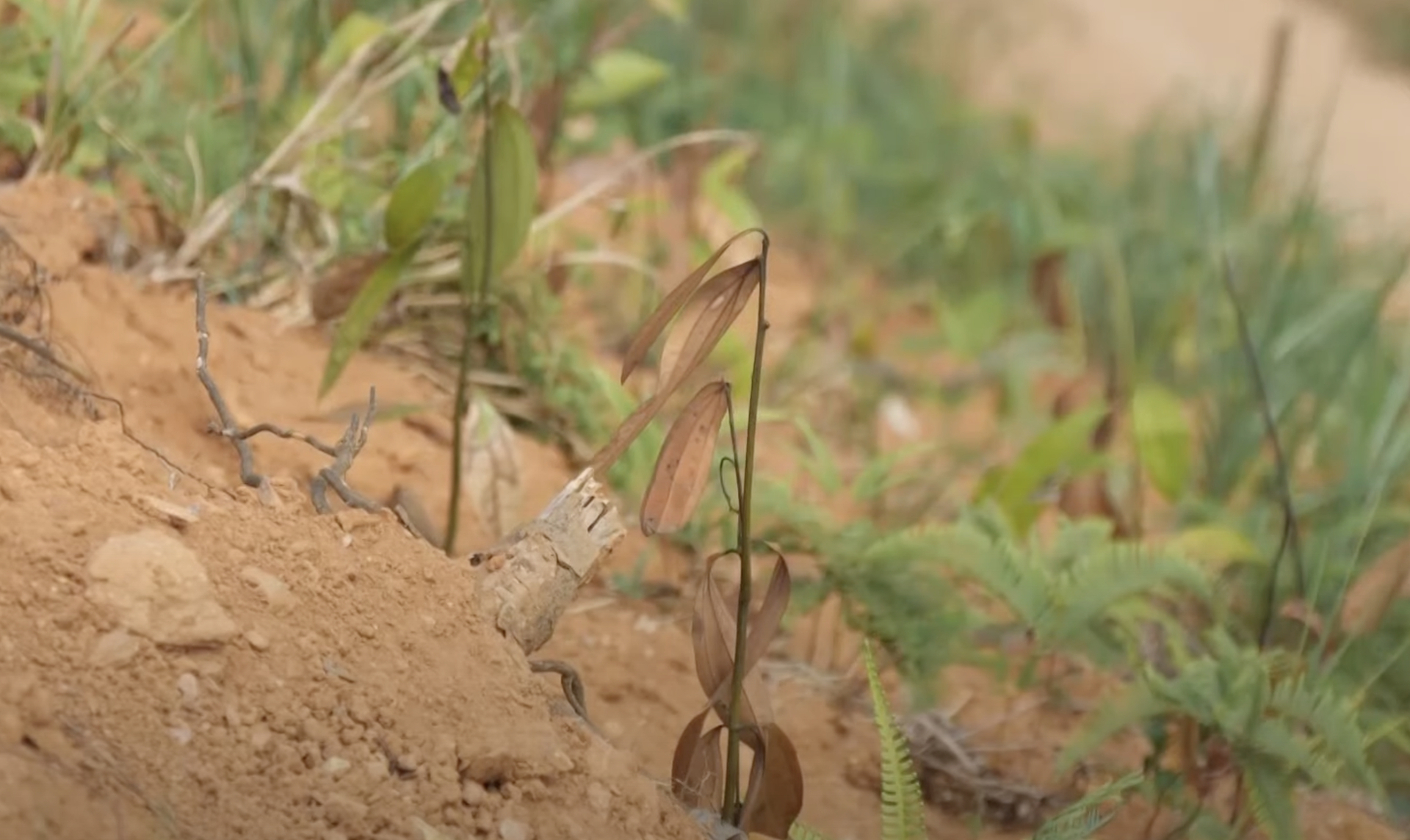November 28, 2025 | 03:48 GMT +7
November 28, 2025 | 03:48 GMT +7
Hotline: 0913.378.918
November 28, 2025 | 03:48 GMT +7
Hotline: 0913.378.918

Multiple rice production area in the highlands of Lao Cai province were damaged by the heat and water shortgae. Photo: Hai Dang.
The recent heatwaves and water shortage have caused substantial damage to agricultural production as well as the people's lives in Lao Cai province. According to statistics compiled from January 1 to the end of June 2023, the total crop production area damaged by heatwaves and water shortage in Lao Cai province was at least 11,500 hectares, with a total damage value of nearly 752 billion VND.
Additionally, heatwaves and water shortage have caused damage to the quality of crops, especially rice and maize. Farmers were forced to replant many crops multiple times after being lost. Several crop production areas have reported a significant decline in their productivity and yield, which has directly affected people's lives in the remote areas of Lao Cai province.
According to Mr. Hoang Quoc Khanh, Vice Chairman of Lao Cai Provincial People's Committee, the province aims to provide local people with assistance through trying times, compensate a portion of the lost labor and costs of materials including seeds, fertilizers, etc. Additionally, the province will partially fund the local production recovery and livelihood stabilization. Accordingly, Lao Cai Provincial People's Committee issued Plan No. 304/PA-UBND on July 17 addressing support for local crop production areas that are damaged heatwaves and water shortage.
The beneficiaries of support for damage caused by heatwaves and water shortage will be households and individuals with crop production areas under the local government's master plan, schedule and guidelines for agricultural production.

Multiple maize producton areas in Lao Cai province were damaged by drought and water shortage. Photo: Thanh Tien.
The level of support for crop production areas damaged by heatwaves and water shortage complies with the Government's Decree No. 02/2017/ND-CP dated January 9, 2017. Accordingly, production areas with damage levels below 70% will not be supported. Local farmers are encouraged to take the initative in restoring crop production areas with damage levels below 70% as well as areas of perennial and annual crops.
Approximately 2,208 hectares of seedling, rice, corn and vegetables with damage levels above 70% will receive a total remedial support budget of nearly 4.7 billion VND. This fund is drawn from the district-level budget reserves, socialization funding and other district-level legal funding sources.
In the event that the total damage exceeds the capacity of a district, Lao Cai province will consider drawing fund from the provincial budget reserve. According to this support plan, the People's Committees of districts, towns and cities are required to review, compile statistics and accurately summarize data on the damaged crop production area; adjust and supplement data in the plan and take responsibility for the data on crop production areas damaged by heatwaves and water shortage.
Additionally, the province will organize the remedial support in accordance with the order, procedures, targets and support norms as prescribed under the Government's Decree No. 02/2017/ND-CP dated January 9, 2017 in order to ensure equity, transparency, and efficiency.
According to Vice Chairman of Lao Cai Provincial People's Committee, this agency has requested the People's Committees of various districts, towns and cities to guide the transformation of the crop structure with a focus on adaptability to climate change. Moreover, local governments have been asked to prepare human resources, materials, means and equipment to promptly respond to the weather and natural disasters that affect agricultural production.
Farmers are instructed to extend the transplanting window or to switch crops on fields that are at risk of drought and water shortage. Regarding the transplanted rice area, farmers should focus on nurturing, preventing pests and diseases, applying adequate and balanced fertilizers, and supplementing with potassium to facilitate crops' growth. In addition, farmers have been advised to increase the frequency of their field visits, and detect harmful pests and diseases early in order to take control measures against small rice leaffolders, blast diseases, etc. These efforts will contribute to a safe and effective production process.
On the other hand, units responsible for the management of irrigation infrastructure are subject to stricter inspection and examination. Local governments will guide its people in taking measures to save water as well as utilize water sources effectively, which will help prevent water shortage and waste.
Regarding maize production, farmers have been advised to replant areas damaged by heatwaves and water shortage; expand the area of intercropping, increase crops on suitable soil types to offset the loss caused by heatwaves and water shortag. Furthermore, farmers should focus on intensive farming to increase the productivity and quality of crops, and expand the production area for the 2023 winter crop.

One-year-old cinnamon tree heavily damaged by the heatwaves in Bao Yen district, Lao Cai province. Photo: Hai Dang.
Farmers in lowland seasonal rice production areas will maintain and expand the field area of a single rice variety in order to utilize the System of Rice Intensification (SRI). The system will reduce the number of varieties, reduce the usage of fertilizer, and save irrigation water. Consequently, the rice will benefit from increased productivity, quality and value.
According to Mr. Le Thanh Hoa, Head of Muong Khuong district's Division of Agriculture and Rural Development, the district has received six tons of maize seed from the national reserve to support farmers with the summer-autumn crop. Additionally, the district plans to support production areas with damage levels above 70% by drawing from the district budget reserve or socialization funding. However, as an impoverished district with a limited budget reserve, Muong Khuong district is proposing to request aid from the province budget reserve.
Muong Khuong district lost over 60 billion VND worth of agricultural production due to heatwaves and drought. However, production areas with damage levels above 70% only lost over 3 billion VND.
Lao Cai province also directed its Department of Agriculture and Rural Development to guide the district People's Committee during the implementation of the support plan; adjust agricultural production in response to the weather and climate; report and propose to the Provincial People's Committee to promptly resolve issues.
Lao Cai province received 25.5 tons of corn seeds from the national reserve in 2023. These seeds are subsequently distributed to the districts for free to support replanting. Additionally, the seeds will help compensate the production areas damaged by drought in the 2023 spring-summer crop.
In addition, the province have actively deployed action plans during heatwaves in order to prevent and overcome damages caused by the drought; ensure water for spring rice and seasonal rice production in the highlands; mobilize the forest rangers to facilitate forest fire prevention and fighting; ensure the supply of food, drinking water, medicines for livestock and poultry.
As a result of the El Nino, heatwaves and water shortage in production and daily life were a common occurrence throughout Lao Cai province. The province reported three prolonged heat waves during the first six months of 2023 with an average temperature ranging from 37 to 39 degrees Celsius. Most notably, the temperature in Lao Cai city reached 40.5 degrees Celsius on May 21, 2023.
Conversely, the rainfall in April, May and June saw a decrease of 38 to 58% compared to previous years, causing water shortage in agricultural production.
Translated by Nguyen Hai Long

(VAN) On November 27, in the meeting with Minister Tran Duc Thang, Mayor Yin Yong shared Beijing’s experience to improve environment and air quality.

(VAN) After 30 years, both sides identified strategic areas of cooperation: sustainable production, increasing coffee value and training for farmers.
/2025/11/27/4910-4-164708_294.jpg)
(VAN) On the afternoon of November 27 in Beijing, Minister of Agriculture and Environment Tran Duc Thang held a working session with several major Chinese enterprises operating in the agriculture and environment sector.

(VAN) The Department of Animal Health issued a provisional guideline requesting local authorities to increase surveillance, collect samples for testing, and conduct epidemiological investigations according to the established procedure.

(VAN) The United Nations recommends that Vietnam utilize data and artificial intelligence to enhance early disaster warnings and reduce GDP losses by 3.2% in the context of climate change.

(VAN) On the morning of November 27 in Beijing, Minister Tran Duc Thang and the Deputy Commissioner General of the General Administration of Customs of China signed a protocol on fresh jackfruit exports.

(VAN) As floodwaters recede, a vast network of irrigation works across eastern Gia Lai is emerging in a state of severe disrepair, with extensive damage demanding urgent restoration ahead of the 2025-2026 winter-spring cropping season.